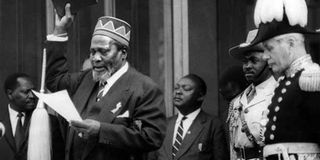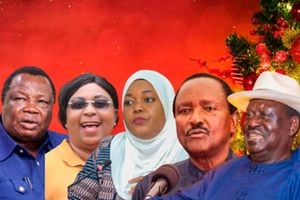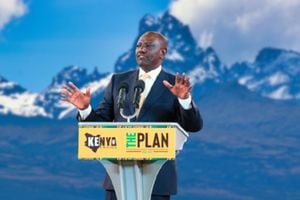Kenya deserves better

Mzee Jomo Kenyatta is sworn in as Kenya’s first Prime Minister on June 1, 1963 in Nairobi. On his right is Governor Malcolm Macdonald. PHOTO | FILE | NATION MEDIA GROUP
As a Kenya-born son, I have always been deeply interested in the development of the country of my birth. Those who have followed my series in the Weekly Review will also know I worked in the civil service across the country for 20 years from 1947 before relocating to England.
As Kenya celebrates her 61st independence anniversary — and as I approach my 96th birthday — it’s time for some stocktaking.
Unfortunately, I was not present at the Independence Day celebrations on December 12, 1963, as my family and I had already booked a road trip to Dar es Salaam and later travelled by air to Zanzibar. The early part of our journey was pleasant and we stopped at the Namanga border post on the Tanganyika (now Tanzania) side to drink a toast to the newly independent Kenya.
We didn’t proceed to Zanzibar immediately, as we spent an excellent Christmas with a dear friend, Bismarck Noronha, who occupied a palatial house on Oyster Bay. We later flew to Zanzibar, where my uncle and aunt had lived for many years.
As I narrated in a recent article, I fell in love with this idyllic island and decided that it was here I would settle when I finally retired.
Unfortunately for us, one morning in January 1964, while we were still asleep, a bloody revolution broke out — staged by the notorious self-styled Ugandan “Field Marshal” John Okello. What was once a peaceful island, where we roamed without fear day and night, had become a battleground. Trigger-happy soldiers began shooting at random! Many people were slaughtered, including Goan friends of my uncle.
This was a sad time and although I had intended to settle on this island upon retirement, we had to make quick arrangements to leave.
As my uncle and aunt were reluctant to join us, we decided to spend a few more days in Zanzibar, trying to convince them to leave but without success. They had lived on the island for years and it was hard to let go. We finally left for Dar es Salaam, and later travelled by road to spend a few days in Mombasa, thanks to my cousin Nico Pinto’s efforts.
Plant Breeding Station
When I finally resumed work at Njoro’s Plant Breeding Station, in the former White Highlands, I learnt that many people had given up hope of finding my family alive and assumed we had been victims of the Zanzibar revolution, with some even offering mass for us. My good friend Robert Ouko, who would later be Kenya’s Foreign minister before his assassination in 1990, played no small part in our rescue from the island, and I remain grateful to him to this day.
I apologise for the digression and now wish to address the subject of this column, that is, whether the fruits of Uhuru (independence) were honestly and equally distributed among the masses.
Speaking personally, I marvel at the great progress Kenya has made in various fields since independence. But it pains me to think that many of my Kenyan friends, who were hoping for a better future, still remain in abject poverty. This is a shame, caused chiefly by the inconsiderate behaviour and greed of some politicians, who had promised a brighter future for their citizens after independence.
I think of the sacrifices made by my dear friends and colleagues such as Robert Ouko and Daudi Dabasso Wabera, my one-time assistant at Marsabit who was brutally murdered along with a chief by Somali dissidents in 1963. I mourned for both and still miss them decades later.
I also think of a family friend, Pio Gama Pinto, whose father and brother stayed with me at Voi. Pinto did much for the people of Kenya and paid for it with his life when he was assassinated in February 1965. In these three friends of mine, and many others, Kenya lost capable people whose contribution would have been immense.
As for what happened after independence, it is a matter of regret that the life of the ordinary mwananchi has generally not significantly improved as much as was hoped when the British colonialists left. It is sad to record that the rot had set in upon independence and the promises made by politicians were meaningless. Many of these influential individuals were busy lining their own pockets while ignoring the plight of the mwananchi.
It pains me to think that today, after more than six decades of independence, not much has been done to uplift the ordinary people of Kenya, for whom life has not changed.
It is my sincere hope, as a lover of Kenya and its people, that today’s politicians will awaken and correct the injustices of the past by ensuring that the interests of the ordinary people are paramount and never forgotten!





